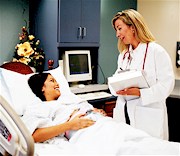Cardiovascular anesthesiologists are doctors who give the medicines used during heart surgery. Texas Heart Institute cardiovascular anesthesiologists are listed in the professional staff directory.
Anesthesiologists also do much more than just work in an operating room. They study the effects of the medicines they give to learn how to best protect your heart and other organs during an operation. Anesthetic medicines relieve pain, maintain blood pressure at safe levels, and keep you asleep during operations.
Before an operation, they meet with you to learn a number of things that will help them care for you during surgery. For example, they may ask
- Why are you having the operation?
- What other health problems do you have?
- What medicines do you take, and have you had allergic reactions to any medicine?
- Have you ever had bad reactions associated with anesthesia or surgery?
During surgery, the cardiovascular anesthesiologist stays in the operating room as a vital part of the surgical team. He or she makes decisions about how to protect and regulate any of your organ systems by using advanced technology to monitor not only your body functions but also the appropriate anesthetic medicines. (See also cardiovascular surgeon and perfusionist.)
After surgery, the anesthesiology team monitors how you wake from the anesthesia and follows your postoperative progress.
Cardiovascular anesthesiologists at the Texas Heart Institute also conduct research to improve anesthesia and patient care during surgery. They study medicines and methods for caring for heart patients before, during, and after an operation. For more details, see Summary of Research.
Updated August 2016



